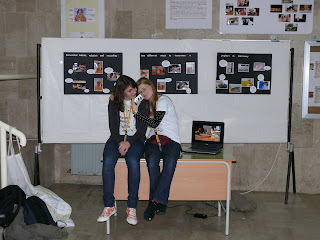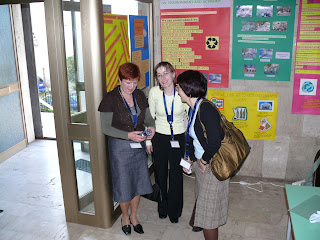Monday, February 04, 2008
The Italian Comenius Group
Zsófi from Hungary
Our journey started at Hanau’s main train station, where I met the other members of the Comenius project who were going to Italy. We were five girls and three teachers and really nervous. After all, we would be in a foreign country soon!
When we were at the airport, we flew to Milan, stopped over there and then continued on to Reggio di Calabria. It was about 20°C all the time we were there.
We met our host families. Most of us knew our partners, because we had chatted on MSN Messenger with them before. Then we had to leave each other – it was time to go.
First it was not so easy to communicate with my host partner, Antonino, and his family. His brother and his mother did not speak English very well. But Antonino was very nice and soon we managed to talk to each other well. In the evening, we met the other German girls and their Italian host partners. We walked through the city, just for fun, and talked and laughed to get to know each other better. Reggio di Calabria is big, with big buildings containing many apartments and narrow streets.
The second day Antonino's mother drove us to the school which was very big, too. In the assembly hall there was a welcoming program. After that, the students from each country – Germany, Hungary, Spain, Denmark, France, Poland and Italy – had to present their project work. Some of them also had a movie to show.
After that, we went to a restaurant in which all of the 50 Comenius participants ate. Regrettably it was too much ... It is definitely a fact that the Italians eat a lot!
Then the different countries arranged their info points and everybody had time to go around and look at them. There was the most going on at the info point of the Italians, who had music there. In the evening, we first went to the Planetarium of Reggio and after that we ate in a Pizzeria without the teachers. It was very funny with all the different countries represented, and there was a lot of talking. Sometimes it was really confusing – I had to speak German with the other Germans, I spoke French to the French boys – I guess trying to understand their English is kind of hopeless –, then I tried speaking Italian with the Italians a bit and spoke in English with most of the other students. We really were an international group and it was a lot of fun.
The mentality of the Italians about the time is interesting. When an Italian person says „we will meet at 9 o'clock“, then this means „we’ll meet around 9:15 or later“! I often observed that we left home five minutes after we actually had to be somewhere! This is one of the main differences between Italy and Germany, I think.
The third day began with watching a film and this was followed by project work. In the evening, some of us went through the city again and I was very surprised to find some German books translated into Italian. But I barely understood them.
There was an excursion the fourth day. We drove to Tropea in two buses where we listened to a tour guide. After that we had some time to spend alone and we went to the beach. I could not believe this was real – it was the first of December and I stood on the beach, with my feet in the water, and it was warm!
When we arrived back in Reggio after two other stops, I was already very tired. But there was a farewell party at about midnight and everybody went there, including me. It was hard to think that this wonderful journey to Italy would be over so soon, but it was. I wasn't very happy. I would have loved to spend more time there.
Saying good-bye the next day was not so easy. I hope to keep in touch with my host partner and I think the others do too. We had to leave, and after stopping over in Rome for about five hours, we landed in Frankfurt and our holiday was really over.
Alexandra Vormberg
Sunday, February 03, 2008
Monday, June 11, 2007
Teachers evaluating the project-work and the meeting
 Evaluation of the meeting – suggestions for the future
Evaluation of the meeting – suggestions for the futureOpening of the meeting as “Warming up” especially for pupils, i.e. games, interactive activities; part of the headmaster perhaps only for teachers
Take care of a good matching of the ages between guest pupils and host pupils
Control of transparencies written by students in the workshops to avoid too many mistakes (by an English teacher)
Meeting in Reggio di Calabria:
Consumer habits and their impact on environment and economy
28th of November – 2nd of December 2007
max. 30 pupils, so 4 – 5 pupils of each country
What to do?
An inquiry in all countries: How much rubbish in my every day life and how to avoid this?
Each school will do this in its own way and prepare a presentation at info-points as usual.
Spain would like to do a common film (DVD). All schools are asked to send videos and/or pictures to Spain before end of October!
Teachers discussing the contents and structure of our "European Cook-Book"
”EUrecipies – Cooking European”
Each country participates in the cookbook with:
one starter
one main course
one dessert
Each dish should be both traditional and healthy
Structure of the cookbook:
Front page: The art-classes of each country make a proposition for a front page, which is emailed to the other participants of the Comenius-project. When all the propositions have been seen, a vote is cast between the participants about which proposition to use.
Title: “EUrecipes – Cooking European”
General Introduction: Explanation of the idea of the cookbook (Renates version), and the structure of the cookbook (7-12 lines). Written in all languages of the project.
Starters from all the countries
Main courses from all the countries
Desserts from all the countries
Overview of the pages in which the dishes of each country is found (f.ex. the dishes of France located in page 3, 12 and 25), ordered alphabetically
Each chapter (starter, main course and dessert) should start with a page containing pictures of the different courses in the chapter with a little flag in the corner of each picture.
There should be a large inviting picture for each course, and a general short and clear text explaining the dish. Each dish is presented in 2 A5-pages, with text set in 10 pkt. Arial. The right page should contain a large inviting picture of the dish. The left page should contain the text ordered as follows:
1. Name of the dish
2. Level of difficulty of the dish, indicated by one to three flags
3. Ingredients
4. Instructions
5. Fact-box, with special information pertaining to the dish and perhaps explanation of difficult words
There should not necessarily be an exactly similar layout of each page, because the layout of these could reflect the diversity of the countries.
Sunday, January 21, 2007
Comenius-Meeting in Hungary December 2006
Topic: Traditional Food and Eating Habits in the Past
Saturday, December 30, 2006
How to inform the school-community about the project and our meeting

We can inform our school with showing photos. For example one can make a special corner where we can put all the photos of the visit and perhaps some posters too. A power-point presentation can also be presented.
One can also organize a meeting where the pupils and teachers come together and the pupils concerned can report on their experience, show photos, perhaps present their diary.
If a school has a school newspaper one can write an article about the meeting.
In addition there is a possibility to put the photos, videos and texts in the internet, e.g. in the “Comenius Blog”.
Of course we have to tell our friends all about the trip and show pictures and videos.
The presentations of the project results


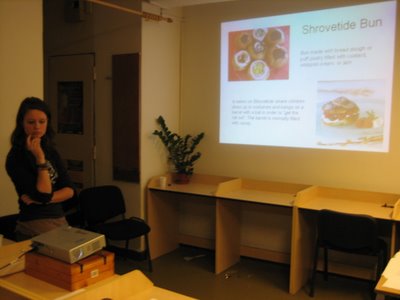


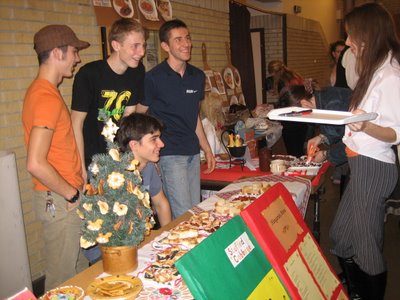
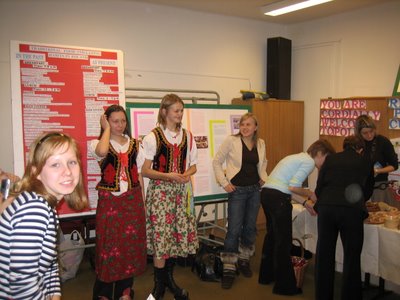

Summary of the feed-back-café
There are some good aspects, but also some negative ones, which the students have mentioned. I begin with the good ones.
All students liked the presentations, they were good, impressive, creative, exciting and with lots of decoration (especially Hungary and Italy). Another point which left a good aftertaste was the food. It tasted delicious, but sometimes a little bit strange.
The students gave their presentations in the form of posters, DVDs, power-point-presentations, films and pictures. The students who presented their works were very friendly, and all questions you asked were answered. All in all the presentations were well received.
But there are also some aspects, the students disliked, for example the organisation. It was confusing because in some rooms there were too many people and in other rooms there weren’t any. Perhaps the next meeting could have one separate room for every presentation. Because the students mentioned that the idea of walking around to every group is a good idea.
For the presenting pupils it’s boring to go through the presentation for four times. That’s perhaps the reason why it’s difficult to understand them because they talk so fast. It’s a pity that in some presentation they didn’t say anything at all.
Some students regret that these days are too short to get to know the other students and their cultures.
In a nutshell all pupils liked the presentations and the idea behind them, but the meeting could be still better if there was another concept to show and look at the presentations.
Friday, December 15, 2006
The Hungarian school and school life
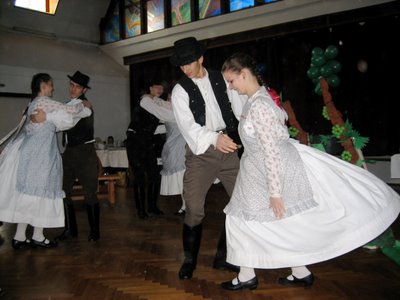
Summary of the Feed-back-café
The school is different of the schools we have in our countries. First of all, it’s very big and even has two buildings with three departments: music, art and dance. But that makes the school interesting as well as the students, they are all very talented and hardworking and it seems that this school teaches a really high level. Because of the huge size of the school there are many (colourful) corridors and sometimes we didn’t know where to go… The bigger building of the school is really beautiful and we really liked being there.
Tuesday, November 07, 2006
Being together with young Europeans
Being together with students of so many different countries all over Europe has been a very great experience for everybody who joined the Comenius project, the members as well as the pupils of the Hungarian host families.
Everybody was very open, very friendly, funny and rather nice, it was really a pleasure getting to know everyone.
We learned a lot about different languages and cultures but we also found out, which might be the more important and interesting point that in the end we are all the same. Young students with similar interests like sports and music, parties and cinema as well as shopping, surfing on the internet and meeting friends.
Understanding worked out very well, despite some little problems referring to the different accents of the different countries we all come from or some minor problems with English as English was the main language of communication. Well, as we all liked each other so much we always found a way to talk which was actually very funny sometimes when sentences were translated into three or four languages by different students.
However it offered the chance to improve our language skills and we learned much.
As most of us spoke about two or three languages before the meeting we all learned some new words during the days we spent together because of the great variety of different languages.
All things considered it was a great experience for life we all don’t want to miss and we are looking forward to having the next meeting of our big Comenius family.








